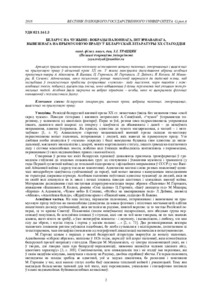Please use this identifier to cite or link to this item:
https://elib.psu.by/handle/123456789/22871Full metadata record
| DC Field | Value | Language |
|---|---|---|
| dc.contributor.author | Траццяк, З. І. | - |
| dc.date.accessioned | 2018-11-28T11:34:07Z | - |
| dc.date.available | 2018-11-28T11:34:07Z | - |
| dc.date.issued | 2018 | - |
| dc.identifier.citation | Вестник Полоцкого государственного университета. Серия A, Гуманитарные науки. - 2018. - № 10 – C. 2-6. | ru_RU |
| dc.identifier.issn | 2070-1608 | - |
| dc.identifier.uri | https://elib.psu.by/handle/123456789/22871 | - |
| dc.description | Belarusians in a Foreign Land: Images of Prisoners of War, Internees, People Sentenced to Hard Labour in the Twentieth-Century Belarusian Literature Z. Tratsiak | ru_RU |
| dc.description.abstract | Артыкул прысвечаны шматаспектнаму асэнсаванню вопыту палонных, інтэрнаваных і вывезеных на прымусовую працу ў айчыннай прозе ХХ ст. У якасці матэрыяла даследавання абраны асобныя празаічныя творы А. Адамовіча, В. Быкава, Ц. Гартнага, М. Гарэцкага, Л. Дайнекі, Я. Коласа, М. Машары, Б. Сачанкі. Адзначаецца, што пісьменнікі розных пакаленняў звярталіся да дадзенай тэмы, каб заглыбіцца ў імагалагічныя праблемы (успрыняцце «чужога»: ладу мыслення, норм паводзін і міжасабовых зносін, побыту), высветліць змены, што адбываюцца ў душы персанажа пад уплывам экстрэмальных падзей. Асобная ўвага звернута на вобраз здрадніка – асобы, што не вытрымала фізічных катаванняў і псіхалагічнага ўціску.= The article is devoted to the multifaceted study of life experience typical for the prisoners of war, intern-ees, people sentenced to hard labour as depicted in the national literature of the twentieth century. The research is based on the prose works by A. Adamovich, V. Bykau, C. Hartny, M. Harecky, L. Dajnieka, Ya. Kolas, M. Mashara, B. Sachanka. It is pointed out that the writers of different generations turned to the subjects connected with some imagalogic problems (perception of the ‘foreign’ way of thinking, standards of behavior and interper-sonal relationships, everyday life). The authors tried to point out those changes which take place in a charac-ter’s soul under the influence of some extreme events. Special attention is drawn to the image of betrayer (a per-son who failed to cope with physical torture and psychological pressure). | ru_RU |
| dc.language.iso | be | ru_RU |
| dc.publisher | Полоцкий государственный университет | ru_RU |
| dc.relation.ispartof | Веснік Полацкага дзяржаўнага ўніверсітэта. Серыя А, Гуманітарныя навук | be_BE |
| dc.relation.ispartof | Herald of Polotsk State University Series A, Humanity sciences | en_EN |
| dc.relation.ispartof | Вестник Полоцкого государственного университета. Серия A, Гуманитарные науки | ru_RU |
| dc.relation.ispartofseries | Серия A, Гуманитарные науки;2018. - № 10 | - |
| dc.rights | open access | ru_RU |
| dc.subject | Государственный рубрикатор НТИ - ВИНИТИ::ОБЩЕСТВЕННЫЕ НАУКИ::Литература. Литературоведение. Устное народное творчество | ru_RU |
| dc.subject | Беларуская літаратура | ru_RU |
| dc.subject | Ваенная проза | ru_RU |
| dc.subject | War prose | ru_RU |
| dc.subject | Belarusian literature | ru_RU |
| dc.title | Беларус на чужыне: вобразы палоннага, інтэрнаванага, вывезенага на прымусовую працу ў беларускай літаратуры ХХ стагоддзя | ru_RU |
| dc.type | Article | ru_RU |
| dc.identifier.udc | 821.161.3 | - |
| Appears in Collections: | 2018, № 10 | |
Items in DSpace are protected by copyright, with all rights reserved, unless otherwise indicated.
